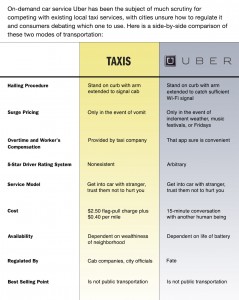Last week, I had a mild case of deja vu reading Lorraine’s post providing an economic analysis of Uber’s entry into the New York transportation market. I couldn’t quite place where I had heard the story before. Then, almost the very next item on my RSS feed was an infographic from the Onion comparing Uber and traditional taxi services. A few days later, I remembered where I had heard about taxi medallions: NPR’s Planet Money. In particular, they ran a show this summer entitled “Taxi King.” The episode features an interview with Gene Freidman, New York taxi fleet magnate, on the declining value of his taxi medallions and, to some degree, the rise of Uber. So, I figured I would share these two takes on the story to kick off this week on the blog.

Although the Onion infographic is mostly facetious, it does point out broad functional similarities between the two services. To ride in either you request/flag a car (at the time you want to take a ride), get in–maybe with some of your friends!–almost exactly where you are, and go almost exactly where you want to go. Or, as the Onion puts it, to catch a Taxi you “stand on curb with arm extended to signal cab” and to catch an Uber you “stand on curb with arm extended to catch sufficient Wi-Fi signal.” Further the Planet Money hosts and interview subject strongly insinuate that they view Uber as at least somewhat of a substitute good for consumers, remarking that they are seated either in taxi cabs or Ubers. Most intriguingly, the hosts also suggest that Uber serves as a substitute good for drivers (i.e. drivers can choose to connect with passengers through Uber or through a Taxi service). They reveal that Gene Freidman is being forced to rent his taxis out to drivers at lower rates due, at least in part, to competition from Uber. However, as Lorraine pointed out last week, data suggest that, in practice, Uber doesn’t serve as a perfect substitute for the traditional Taxi in New York City. This functional/anecdotal perspective raises the question, “Why?” With so many functional similarities, what traits of Uber, in particular, prevent it from serving as more of a perfect substitute for the traditional Taxi?
